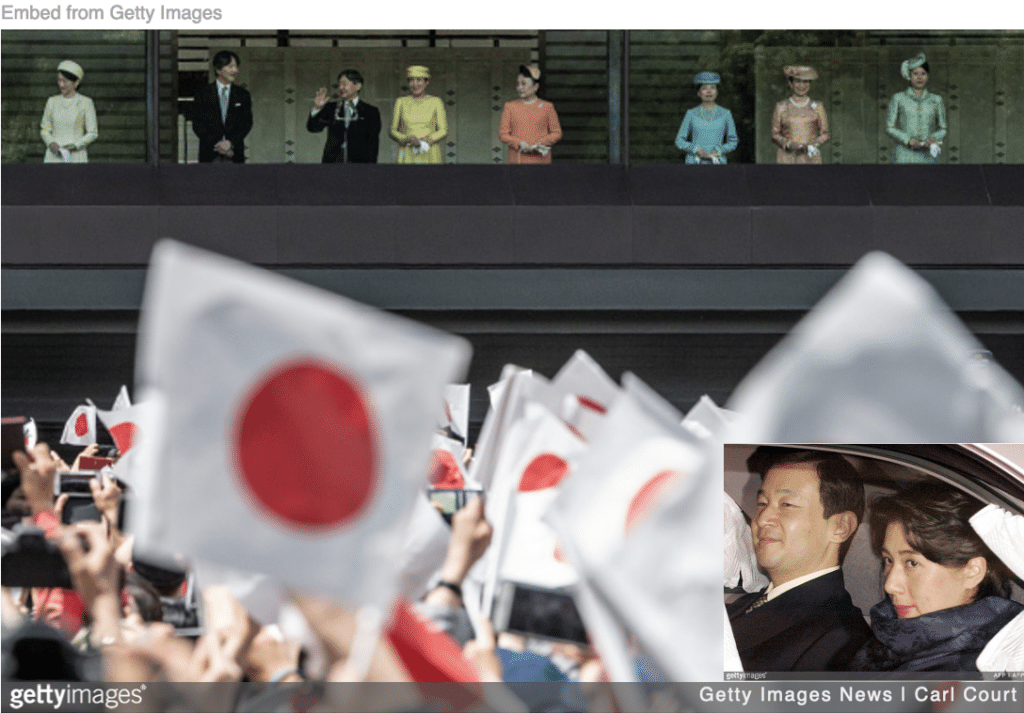
Royalty
Royalty is an absurd anachronism. It’s an ostentatious affront to the universal declaration that all people are created equal.
Yet millions of people remain loyal to this imperial vestige of national governance. Mind you, many royals seem incapable of conforming their behavior to the standards of common decency, to say nothing of royal etiquette. But their behavior is the least of what informs my disdain for this institution.
You might have no clue that royalty exists in Africa and Asia. That’s because Western media focus almost exclusively on the royal families of Europe and the Middle East.
Indeed, their coverage provoked the commentary I published just last week on that royal shrew, Princess Michael of Kent. But, while writing it, I kept thinking of the one royal who intrigues me and for whom I have grave concerns.
Who is Masako Owada?
Masako entered public consciousness at 30. By then, she was already a cosmopolitan career woman with graduate degrees from Harvard and Oxford.
Unsurprisingly, Masako seemed much less the sacrificial lamb Diana Spencer seemed when she entered at 19. Diana was a naïve babysitter who capped her education at a finishing school in Switzerland.
Masako married Crown Prince Naruhito on June 9, 1993. I was dismayed that this educated, sophisticated, and liberated woman would subject herself to the confining and provincial protocols of royal life.
After all, Masako had more in common with Hillary Clinton than Princess Diana. But I was interested in observing how she would adapt. Indeed, I thought she might humanize and demystify the Japanese Imperial family, the oldest continuous hereditary monarchy in the world.
Masako, a royal disappointment
Early in their marriage, Princess Masako perfected the coy Lady Di look, which only increased the public’s interest in her. And, to his credit, Prince Naruhito didn’t seem to mind Masako’s mushrooming popularity.

By contrast, Prince Charles famously resented the public interest Diana courted with her coy look. This, especially as she blossomed from the shy virgin he deflowered into a cocksure glamour puss he could not keep up with.
Unfortunately, Masako’s reign as crown princess has been fraught with even more despair and frustration than Diana’s. But Diana’s marital woes stemmed from having a third person in her marriage from her wedding day. Masako’s stemmed from having difficulty producing a male heir.
She finally gave birth to a healthy baby girl in 2001. But, cruelly, that only added insult to the dashed expectations of the Imperial family and her loyal subjects. By contrast, the properly fecund Diana exceeded expectations by producing an heir and a spare. Never mind that doing so did her no good.
Masako’s breakdown
Alas, Masako may never fulfill her only royal duty that matters. Because the unnatural anxieties that reportedly inhibited her performance at 30 are bound to preclude the belated birth of a male heir at 42.
Therefore, in light of such unforgiving stresses, it came as no surprise when the Imperial Household Agency announced last year that:
Crown Princess Masako was exhausted [and had] excused herself from royal duties. [S]he had taken refuge at her family’s home in a wooden mountain resort.
The Agency declared her “mentally ill.” It conceded that no one had any idea when (or if) she planned to resume her royal duties. And so the last image the public had of Masako was her being driven from a Japanese sanatorium last December. She reportedly had treatment for her “adjustment disorder.”
Remarkably, Masako performed less than 10% of the royal duties Diana did. Granted, the ancient Japanese rigors she had to perform behind closed doors trying to produce a male heir are shrouded in secret.
But her reign as Japan’s Crown Princess was conspicuous, even troubling because she hardly ever appeared in public. Indeed, her failure to produce a male heir has been disappointing enough. But she compounded it by failing to perform her more ceremonial role (at home and abroad) as the “symbol of the nation.”
Incidentally, given her anxieties and depression about childbirth, perhaps Masako should retain Tom Cruise for psychological counseling.
A female heir?
Masako’s breakdown has Japanese lawmakers debating changing Japan’s Imperial succession rule to allow a female to ascend the Chrysanthemum Throne. Because:
Under a post-World War II law, only males can assume the throne. There are no princes in the generation after Naruhito, whose younger brother has two daughters. Naruhito’s only sister is 35 and says she has no immediate plans to marry.
(China Daily, April 24, 2004)
As Japanese MP Satsuki Eda pointed out:
There is simply no reason why we shouldn’t allow a woman to reign. … I think it is a very good thing that we are able to discuss this issue, without worrying about taboos.
Incidentally, Prince Albert recently decreed changes in Monaco’s succession laws. He didn’t change them to allow a female successor. Rather contemptibly, he did so to ensure his Black son could never ascend his Monegasque Throne.
Lawmakers may seem keen to find legal daylight for her daughter to shine. But they seem perfectly happy to allow Masako to languish in darkness for the rest of her days.
Yet, ironically, Masako’s intelligence might save her from Diana’s fate. She seems sensible enough to understand that the Japanese will never accept her as crown princess or empress, that is, unless she satisfies the chauvinistic demands of the Imperial household by producing a male heir.
So, here’s to the Masako’s family for giving her refuge from the conspiring machinations of royal courtiers. I hope she finds happiness in her mountain retreat. Because no liberated and self-respecting woman could ever find it in a royal marriage.
Anonymous says
only a socialist, commie pinko like you would be against royalty.